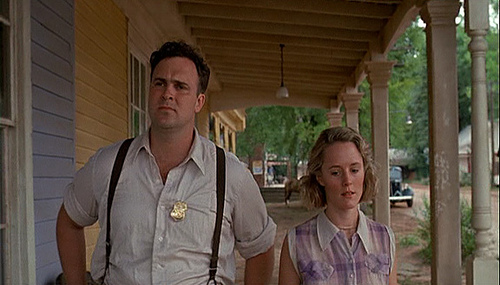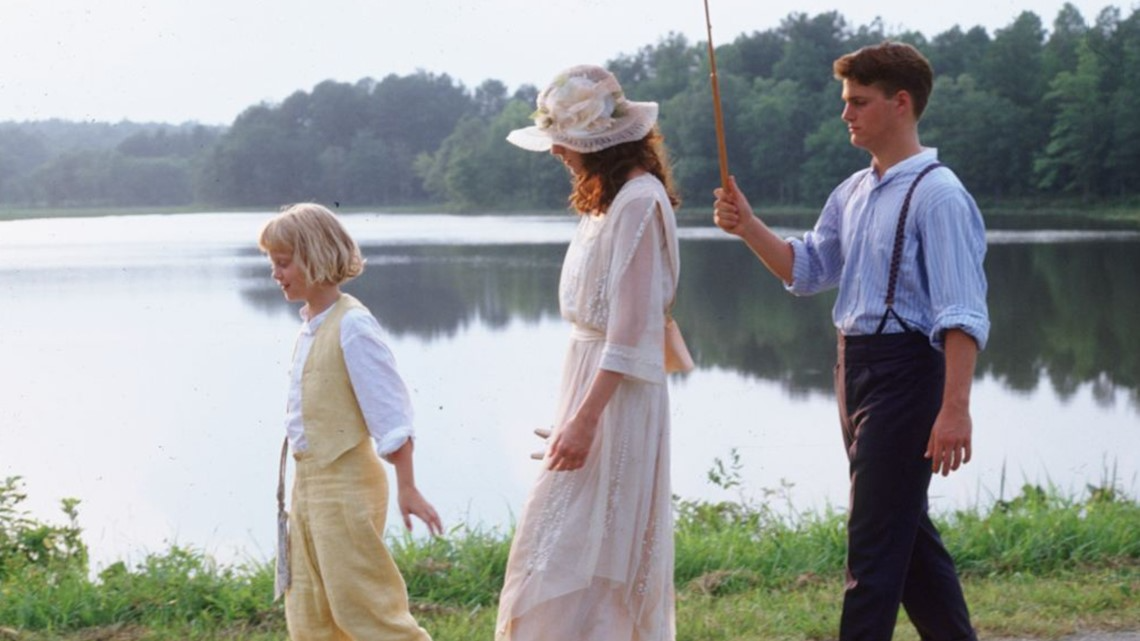
A Moment Apart From the World
In a film as rich with metaphor as Fried Green Tomatoes, the river scene between Idgie Threadgoode and Ruth Jamison stands out as a moment of rare emotional clarity. Tucked away from the gaze of Whistle Stop and all its expectations, this quiet encounter beside a flowing river gives viewers a glimpse into the emotional heart of the story—the transformation of friendship into something deeper, more sacred.
The water ripples gently beside them as they sit together. There are no dramatic declarations, no music swelling in the background. Just the sound of water, soft voices, and a kind of safety that comes only when two people allow themselves to be fully seen.
Unspoken Affection and Longing
By this point in the film, Ruth and Idgie have already formed a close bond. They’ve cooked together, laughed together, even challenged social norms by co-running the Whistle Stop Café. But the river scene captures a new emotional threshold: the moment when shared affection quietly tips into the realm of romantic intimacy, even if it is never named aloud.
They speak in coded words—stories, memories, gentle teases—but the way Ruth looks at Idgie, and the way Idgie lowers her eyes in response, speaks volumes. In this moment, they aren’t just friends. They are soulmates navigating a world that offers no script for what they feel.
This is not a traditional love story, and Fried Green Tomatoes never demands that it be one. But it is a love story nonetheless—written in gestures, glances, and the courage to be vulnerable.
The River as Emotional Mirror

Water has long served as a metaphor in literature and film for transition, reflection, and emotional depth. In this scene, the river beside them serves as more than scenery—it becomes a mirror to their internal states.
For Idgie, the river reflects the wildness she carries within her—the resistance to form, to control, to expectation. But in Ruth’s presence, the river also becomes a space of calm, of peace, and of hope. She can be both wild and still. Both strong and soft.
For Ruth, the river is a threshold. She’s come from a world of rules and violence, where her life has been dictated by men and religious duty. Sitting beside Idgie, beside this moving water, she begins to imagine a different kind of life—one where love is gentle, freedom is real, and no one owns her.
The river, in this moment, is sanctuary.
Humor as a Veil and Bridge
Idgie has always used humor as a form of armor. In the river scene, she tells stories of her childhood misadventures—chasing trains, wrestling with Buddy, running barefoot through the woods. But for the first time, the humor doesn’t just serve as a shield; it becomes a bridge.
Ruth doesn’t laugh at Idgie’s stories the way others do. She sees through them. She sees the grief beneath the mischief, the loss behind the bravado. And when she responds, it isn’t with judgment or pity, but with understanding.
Their laughter becomes a shared language—one that allows grief, love, and memory to coexist.
A Safe Space in a Harsh World
In the early 20th-century South, the love between two women had no legal recognition, no societal place, and often, no protection. The world outside the riverbank would never validate what they shared. But here, in this moment, none of that matters.
The river scene creates a temporary world where there are no eyes watching, no expectations to meet. Only two women, side by side, letting their hearts speak in subtle ways.
It is in this space that Ruth first dares to lean closer. Not physically, but emotionally. She listens more deeply. She smiles longer. She lets her guard down. And Idgie, in turn, allows herself to be known—not just as a rebel, but as someone deeply capable of love.
The Edge of Something Sacred
What makes this scene so powerful is what it resists. It does not push these characters into a Hollywood-style kiss or a dramatic outburst. Instead, it lingers at the edge of what’s possible, honoring the complexity of their love.
It understands that for women like Idgie and Ruth, love had to be careful. It had to live in the quiet. It had to be carved out from the margins of a society that didn’t see it as real.
But the film treats this moment with reverence. The intimacy between them is not reduced or diminished—it is elevated.
The river becomes not just a setting, but a witness.
Resonance in the Modern Frame
When Evelyn hears this part of the story from Ninny Threadgoode, she too begins to sense the deeper truths beneath the surface. Evelyn, trapped in her own repressed life, recognizes in Ruth and Idgie’s river moment the kind of connection she has never experienced—but desperately longs for.
This becomes the quiet genius of Fried Green Tomatoes: it tells a hidden love story across generations. The river doesn’t just connect Ruth and Idgie—it connects the past and the present, the silenced and the awakening.
Evelyn begins to realize that the deepest revolutions happen in the heart.
Legacy of the Scene
Years after its release, the river scene remains one of the most discussed and cherished moments in the film—not because it’s loud or confrontational, but because it is deeply true. It captures something rare in cinema: the moment love begins to bloom in silence.
For LGBTQ+ audiences, it has become a symbol of recognition—a scene that says, “Your story exists, even if it’s told in whispers.”
For all audiences, it is a testament to the power of emotional intimacy, and the ways in which the human heart seeks connection, even when the world offers no map.
Conclusion: Where Love Flows Free
The river scene between Idgie and Ruth in Fried Green Tomatoes is more than just a quiet interlude—it is the emotional cornerstone of their relationship. It is the place where friendship transforms, where unspoken truths emerge, and where love—defiant, complicated, beautiful—flows freely for just a moment.
In the film’s tapestry of humor, tragedy, resilience, and transformation, this scene reminds us that the most powerful expressions of love are often the most tender. And that sometimes, the bravest thing we can do is sit beside someone, speak gently, and let the current carry us someplace new.
